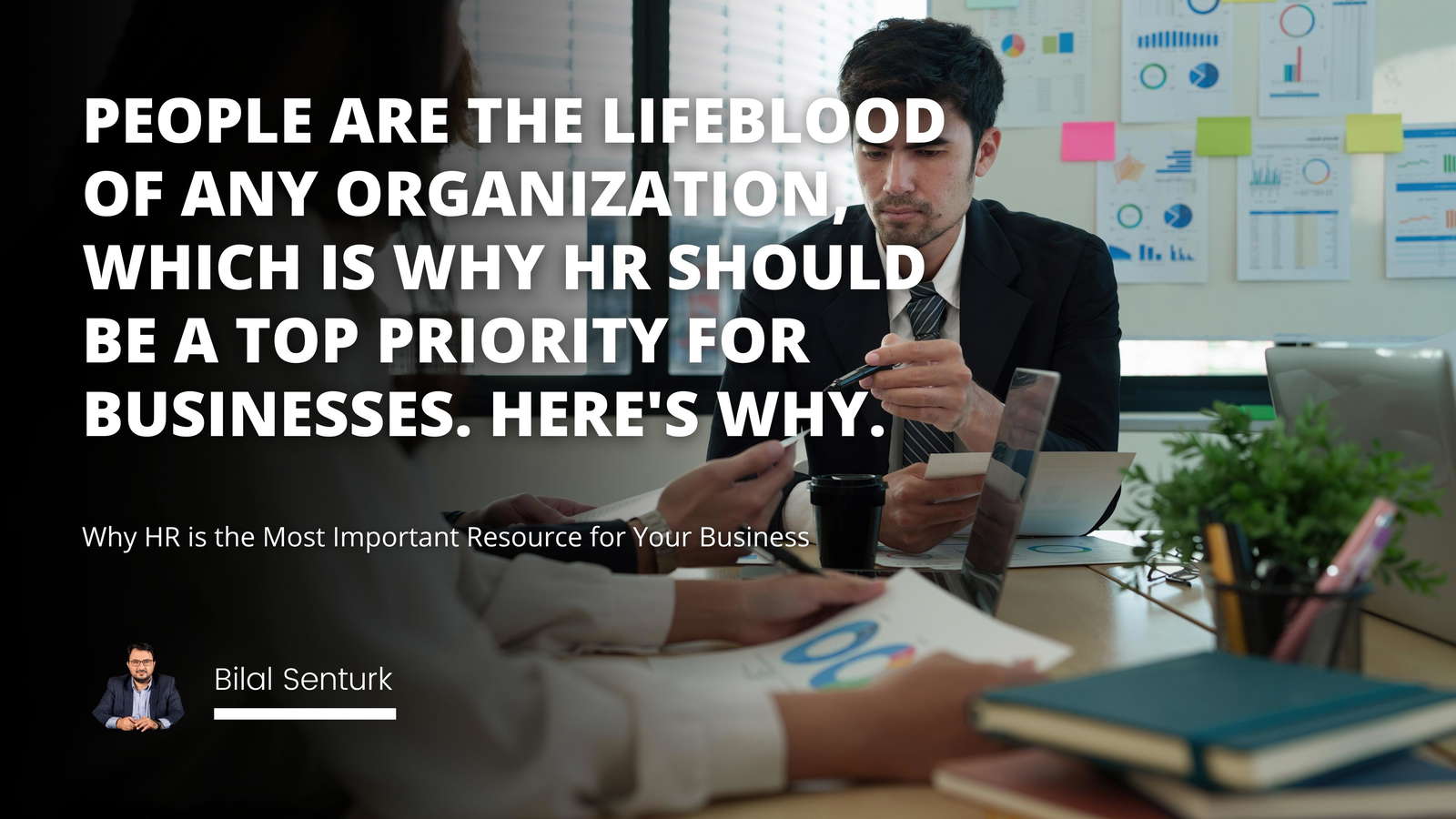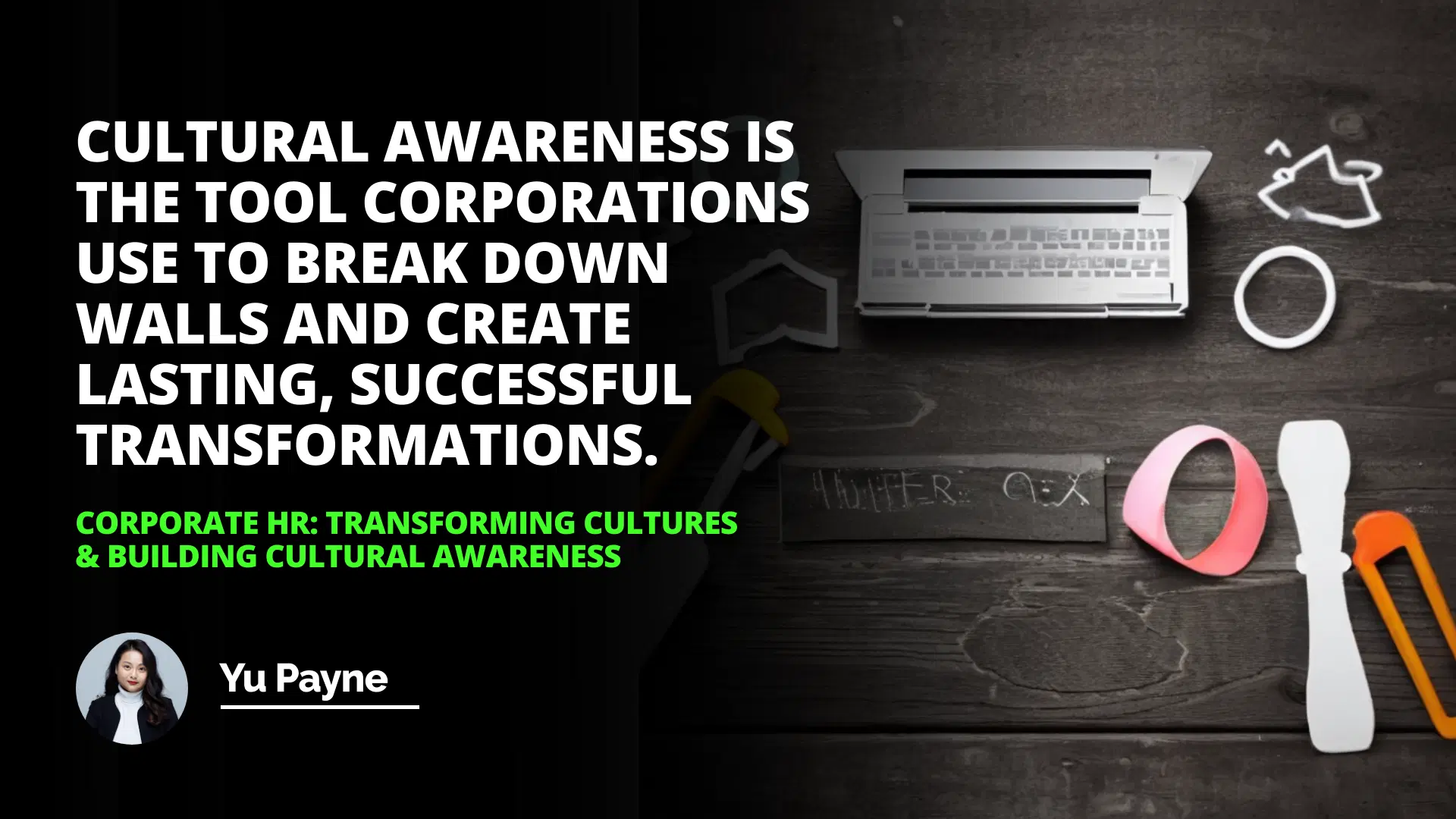
Transforming Cultures in the Workplace
Building Cultural Awareness
Moving Forward: Creating a Future of Cultural Inclusivity
In today's workplace, corporate HR (Human Resources) plays a critical role in creating a positive and successful culture where employees can thrive, engage and be productive. Corporate HR has to keep up with the ever-evolving needs, expectations, and practices of the workplace, and building cultural awareness is a vital part of this process.
Cultural awareness enables the organization to create an environment that values and respects individuals of all backgrounds and creates a culture of belonging for all employees. In this blog post, we will explore how corporate HR can promote cultural awareness and successfully foster cultures of inclusivity and positivity.
Transforming Cultures in the Workplace
Organizational culture, defined as "the shared values and beliefs that guide the behavior of individuals and groups within an organization," significantly impacts the internal workings of a company and the level of employee engagement. Therefore, building cultural awareness is essential for transforming organizational culture and creating a culture of inclusivity and respect.
When examining the impact of cultural awareness in the workplace, it is essential to consider the importance of recognizing and honoring the different backgrounds and experiences of individual employees. With this update, HR can develop systems and initiatives to create an environment where everyone can thrive. Corporate HR can foster cultural evolution by having an open dialogue about identity and cultural differences and highlighting the unique perspectives each employee brings an s to the organization.
Benefits of Supporting Cultural Evolution
When a corporate HR team supports a culture of shunning workplace discrimination and encourages healthy debate about diversity, it can create a more engaged and unified workforce. Additionally, it can result in higher productivity, improved company morale, increased creativity, and better customer service.
By recognizing and maintaining differences within the organization, people are more likely to be open and honest with one another, creating an environment of trust and respect.
Building Cultural Awareness
Creating a culture of awareness and inclusivity can be difficult, but it is a critical aspect of corporate HR's responsibilities. Several key strategies can be implemented to help create and foster a culture of understanding and respect.
Creating Cultural Agreements
To ensure that all team members clearly understand company culture, creating a set of shared agreements is essential. These agreements should be simple, concise, achievable, and measurable. Additionally, they should encompass a wide range of topics, such as respect, communication, collaboration, and feedback. By creating these conditions, corporate HR can encourage employees to work harmoniously and value each other's differences.
Cultural Training & Education
Artistic training and education can benefit corporate HR departments by creating a culture of understanding. Through formal and informabenefitearn about different cultures, share their unique perspectives, and gain valuable insights into how other cultures think, behave, and communicate. This type of education can be precious in multinational organizations, as it can help employees develop an awareness of different cultural values and norms.
Celebrating Diversity & Cultural Inclusion
Celebrating diversity and recognizing different cultures within the workplace can create an environment of inclusion and positivity. Corporate HR can be crucial in fostering a positive environment by promoting diversity and highlighting cultural events and activities. Additionally, HR can bring in external speakers, host events, and encourage conversations about different cultures to promote cultural awareness further.
Moving Forward: Creating a Future of Cultural Inclusivity
As corporate HR continues to promote cultural awareness further and cultural understanding, several elements can be considered to ensure that the desired outcomes are achieved.
Implemenseveral elements can that cultural development is practical, corporate HR needs to implement effective practices. This includes setting team and organizational goals for artistic development, regularly assessing and reviewing progress, and creating an environment where employees feel comfortable sharing their perspectives. Additionally, having open and honest conversations about different identities and backgrounds can help create a more inclusive environment.
Measuring Cultural Development & Awareness
Measuring cultural development and awareness is essential for ensuring that progress is being made and that the desired objectives have been met. Regular surveys, focus groups, and one-on-one dialogues are effective methods for gathering meaningful data that allow corporate HR to measure progress and improve.
In conclusion, corporate HR is essential to transform organizational culture and create a culture of understanding and acceptance. By establishing cultural agreements, providing educational resources, and celebrating diversity, corporate HR has the potential to create a more inclusive and productive workplace. Furthermore, through effective practices and regular assessments, corporate HR can ensure that cultural development and awareness are continuously promoted.
Cultural awareness is the tool corporations use to break down walls and create prosperous, lasting transformations.
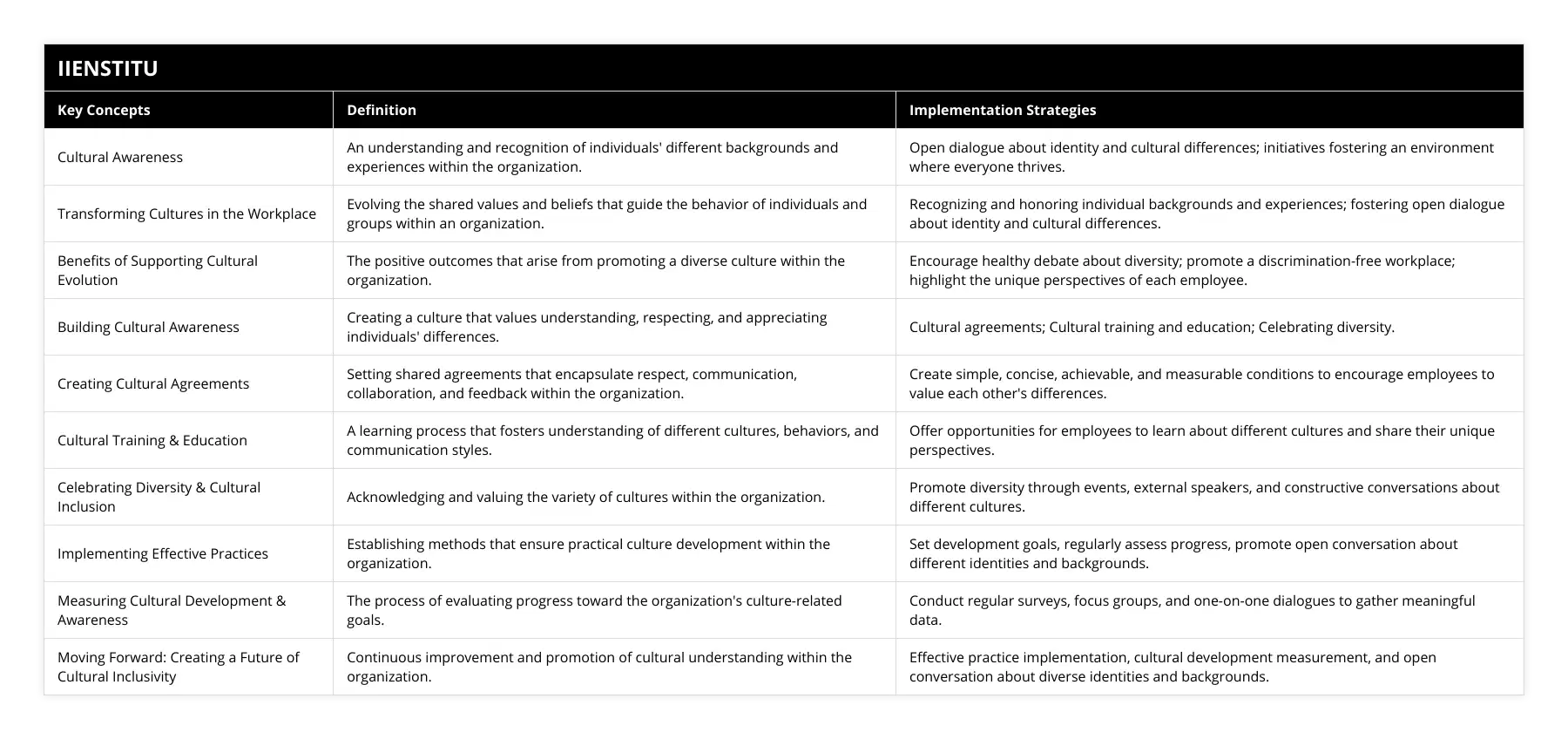
The article emphasizes the pivotal role of corporate HR in instigating cultural awareness and inclusivity in the workplace, transforming cultures to empower employees and boosting productivity. HR classes are important in equipping HR professionals with the skills required to stimulate open dialogue around identity and cultural differences, fostering respect and understanding among team members. The text highlights several strategies that HR can implement towards achieving this goal, including setting cultural agreements, facilitating cultural training and education, celebrating diversity, implementing effective practices, and measuring cultural development and awareness. Through these strategies, corporate HR stands to benefit from higher engagement, better morale, increased creativity, and improved customer service.hr classes
Frequently Asked Questions
How can corporate HR transform company culture?
Human Resources (HR) is uniquely essential in transforming business employee culture. The HR function can significantly impact how employee dynamics and attitudes influence corporate culture. The scope of HR activities ranges from recruitment to training, career development, compensation, and employee benefits. HR can lay the foundations for a productive and proactive work culture by using a strategic approach and effective policies.
One of the most critical HR activities is recruitment. A recruitment process is a powerful tool for establishing a healthy and productive work environment. , from onboarding and developing new employees to retaining existing ones. Therefore, the HR department must ensure that new hires reflect the core values of the organization and that the processes for onboarding, training and coaching are rigorous, practical, and aligned with the company’s desired culture. Additionally, the HR team should strive to reassess recruitment goals periodically to ensure that the organization stays aligned with its cultural aims.
Another critical area for HR is employee development. Employees must be given clear goals, individualized feedback, and consistent support to help them develop professionally. HR should monitor performance progress and create opportunities for employees to practice self-reflection and identify areas for improvement. Additionally, employee development should be conscious of company culture and include activities tailored to its values and goals, such as team-building exercises, workshops, and leadership training.
Furthermore, HR should consider employee satisfaction and what strategies could be implemented to improve the overall work environment. For example, policies such as flexible working hours and comfortable amenities can positively impact employees’ morale and performance. Additionally, HR should use engagement surveys regularly to track employee satisfaction and identify areas for improvement.
In conclusion, HR is essential in encouraging and supporting a productive and engaging work culture. The HR department can create an environment that promotes a healthy and prosperous corporate culture by taking a strategic approach to recruitment and employee development and focusing on employee satisfaction and engagement.
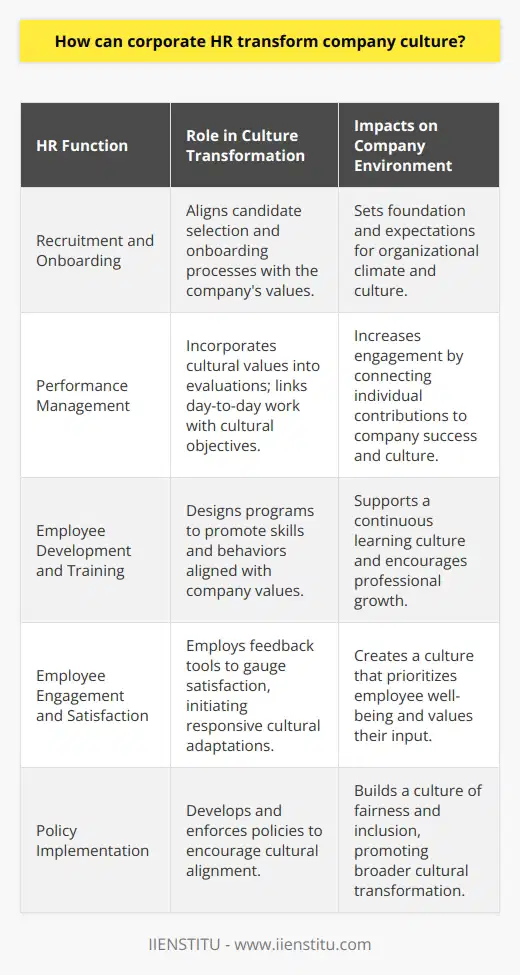
What strategies can corporate HR use to build cultural awareness among employees?
The contemporary organizational landscape necessitates effective strategies to manage and implement cultural awareness within today's workplaces. To achieve high levels of synergy between employees, organizations need to develop strategies that foster cultural awareness among employees. Corporate Human Resource Departments play a significant role in this process and leverage various techniques to build cultural understanding.
One of the effective strategies that may be utilized to build cultural awareness is by arranging cultural appreciation classes and seminars. Employees are exposed to different cultures' norms, values, and behaviors in these classes. Moreover, employees can gain insight into cultural behaviors and the underlying motivations for these behaviors. In addition, such courses can also be used to dispel existing stereotypes about different cultures, enabling employees to interact more effectively with individuals from different cultural backgrounds.
Additionally, corporate HR departments may implement multicultural 360-degree feedback systems as part of performance reviews. This system can help employees understand how colleagues from different cultures perceive their work. Moreover, it can help identify any prevailing cultural biases and contribute towards improved workplace norms and behavior.
Corporate HR can also leverage technology to create a greater awareness of cultural norms and behaviors. This can involve the establishment of portals and forums where employees can interact with colleagues from different cultural backgrounds, allowing greater exchange of cultural knowledge. Furthermore, professionals from different cultural backgrounds may be roped in as guest speakers to provide insights into their societies, which could have a more powerful and durable impact.
The effectiveness of these strategies, and any other corporate HR methods designed to build cultural awareness, depends on organizational leaders' commitment. Senior managers must take a proactive approach toward creating the desired organizational culture, ensuring that employees take the strategies seriously.
In conclusion, corporate HR is a significant player in making the workplace more culturally aware. By implementing strategies such as arranging seminars and classes, leveraging feedback systems, and utilizing technology, corporate HR can make employees more conscious of the many cultural nuances in today's often multicultural workforce.
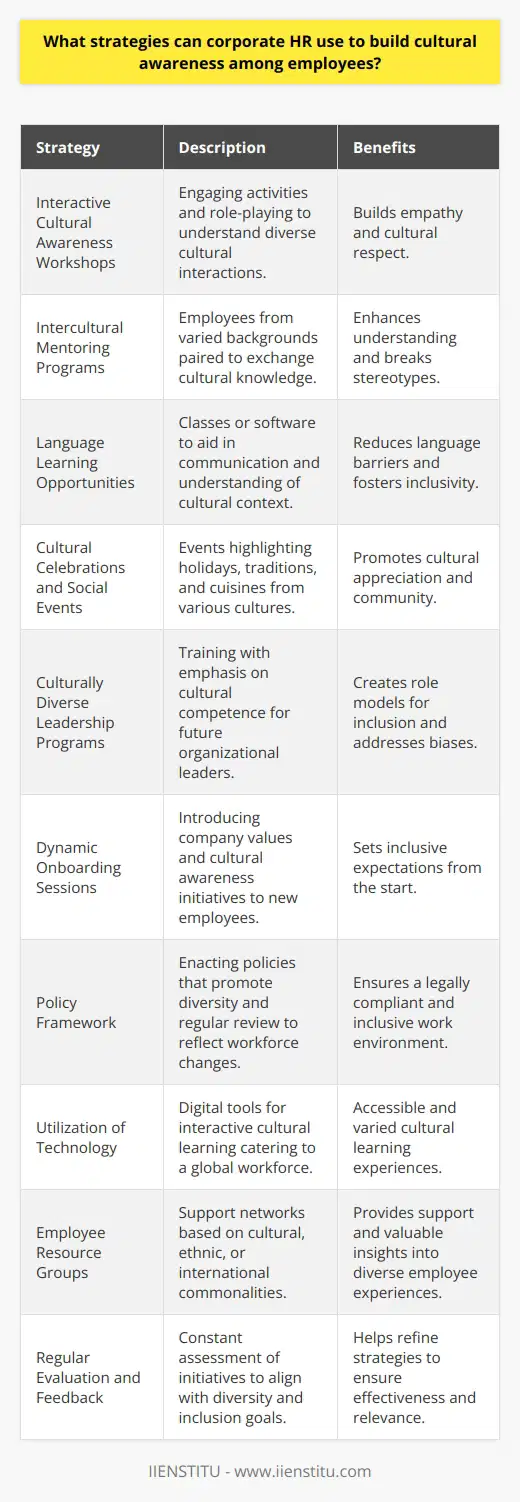
What methods can corporate HR use to measure the effectiveness of changes to company culture?
In today's world, a company's culture is critical to its success. How workers behave, communicate, interact, and collaborate significantly impacts the company's output and profitability. For this reason, many companies today are focusing on the importance of cultivating the right corporate culture. As companies strive to create an atmosphere that fosters innovation, employee engagement, and productivity, Human Resources (HR), professionals must assess workplace culture-altering initiatives' effectiveness.
To measure the effectiveness of changes to company culture, HR departments must consider three fundamental components of workplace culture: attitudes and values, organizational structure, and job design. The philosophy and values of a company's workforce should be assessed through metrics such as surveys, interviews, and focus groups. These tools help to paint a picture of what employees think and feel about the corporate culture. Organizational structure is related to formal procedures, processes, and systems. Finally, job design provides insight into how tasks, roles, and responsibilities are managed. HR personnel should use metrics such as the number of working hours, job satisfaction, and employee turnover rates to evaluate the effectiveness of organizational structure and job design.
In addition to these metrics, HR departments can use a few additional methods to assess the impact of corporate culture changes. Firstly, HR should track the progress of the change initiatives to ensure they are implemented as intended. Additionally, they should track productivity, profitability, customer satisfaction scores, and employee retention rates. Lastly, HR personnel should review and analyze employee feedback after implementing changes to gain further insights.
For corporate HR to measure the effectiveness of changes to company culture, they must examine the critical components of the workplace culture and use specific metrics to evaluate their effectiveness. By tracking the progress of the changes, assessing productivity and profitability metrics, and analyzing employee feedback, the HR department can understand the effectiveness of their efforts and the impact of the changes on the overall workplace culture.
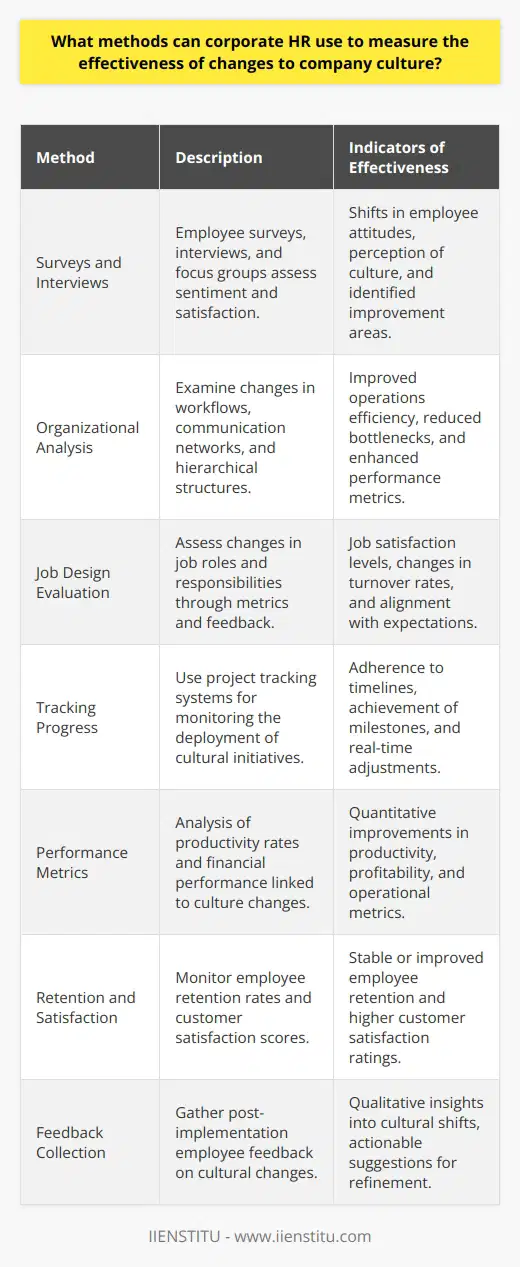
What is the significance of HR's role in fostering an inclusive and diverse company culture?
The Importance of HR in Creating an Inclusive and Diverse Culture
Fostering Inclusivity and Diversity
Human Resources (HR) plays a pivotal role in cultivating an inclusive and diverse company culture by implementing well-designed strategies and policies. In today's globalized corporate environment, a diverse workforce is essential for a company's success, innovation, and problem-solving abilities. HR's responsibility extends to ensuring equal opportunities for all employees and creating a space that respects and values individual differences.
Attracting Diverse Talent
To foster diversity, HR must work proactively to create a talent acquisition framework that encourages the recruitment of individuals from diverse backgrounds, including gender, race, ethnicity, age, and ability. This can be achieved by using inclusive job postings, offering flexible work arrangements, and tapping into diverse talent pools. Ultimately, these efforts contribute to a more dynamic and innovative workplace culture.
Developing Inclusive Leadership
In addition to attracting diverse talent, HR has the essential task of promoting inclusive leadership within the organization. This can be achieved through targeted training programs that enable managers and team leaders to recognize, value, and leverage the unique backgrounds and perspectives of their team members. By fostering inclusive leadership, HR helps build a workplace culture that encourages collaboration, communication, and creativity, directly contributing to the company's success.
Implementing Effective Policies
To maintain an inclusive and diverse workplace, HR plays a major role in designing and implementing policies that actively promote equity and inclusion. This includes developing robust anti-discrimination and anti-harassment policies, as well as creating accessible channels for employees to raise concerns regarding diversity and inclusion. By proactively addressing potential issues and fostering a positive organizational culture, HR plays a critical role in sustaining an inclusive working environment.
Measuring Progress and Providing Support
Another important aspect of HR's role in fostering inclusivity and diversity is measuring the progress of their efforts and providing the necessary support to employees. By gathering data on employee demographics, satisfaction, and engagement, HR can evaluate the success of their initiatives and identify areas for improvement. Additionally, HR remains an essential resource for employees experiencing any challenges related to diversity and inclusivity concerns.
In conclusion, HR plays a significant role in both creating and maintaining an inclusive and diverse company culture. Through attracting diverse talent, developing inclusive leadership, implementing effective policies, and providing support, HR contributes to a workplace that values and leverages the unique backgrounds and perspectives of all employees. This ultimately results in enhanced innovation, productivity, and success for the organization as a whole.
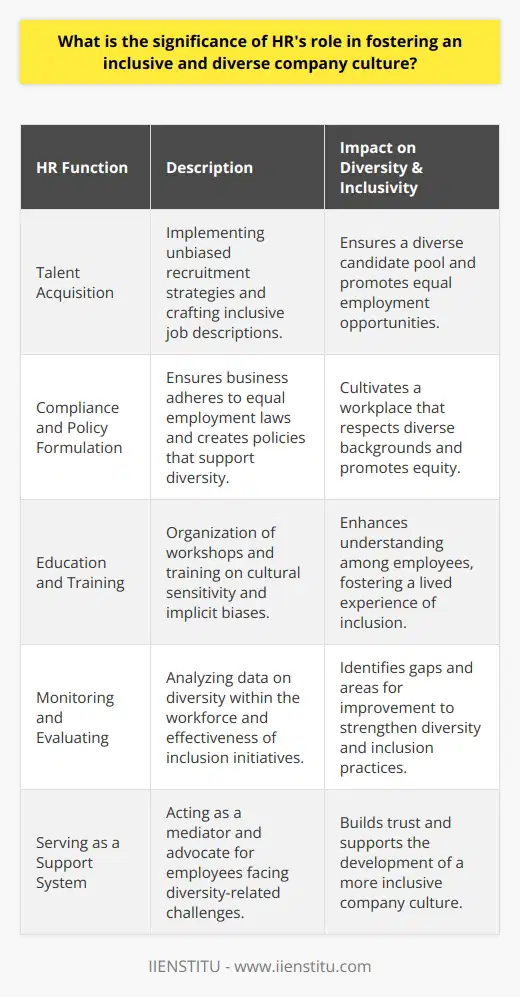
How can HR implement strategies to bridge cultural gaps within an organization?
Understanding Cultural Diversity
To bridge cultural gaps within an organization, HR must first understand the diverse cultural backgrounds of the employees. This can be achieved by conducting cultural awareness training sessions and encouraging open discussions among staff.
Creating an Inclusive Environment
Next, HR should create an inclusive work environment that values diversity and promotes cultural competence as a core organizational value. This can be done by implementing diversity-friendly policies and practices, such as flexible work arrangements and inclusive meeting practices.
Cross-Cultural Communication Skills
HR must ensure that employees possess the necessary cross-cultural communication skills to effectively collaborate with their colleagues from diverse backgrounds. This can be achieved through regular workshops and training programs that focus on improving both verbal and non-verbal communication skills.
Cultural Integration Programs
HR should also design cultural integration programs and initiatives to facilitate positive intercultural interactions between employees of different cultural backgrounds. This may include team-building activities, cultural exchange programs, and mentoring relationships.
Employee Resource Groups
Establishing employee resource groups (ERGs) is an effective way for HR to support employees belonging to diverse cultural backgrounds. ERGs can provide support, resources, and networking opportunities to employees, which in turn fosters an environment of inclusivity and cultural understanding.
Monitoring and Evaluation
Finally, HR must continually assess the progress of their diversity initiatives to ensure that they are effectively bridging the cultural gaps within the organization. This can be done by gathering feedback from employees, monitoring key diversity metrics, and making necessary adjustments to the diversity strategies.
In conclusion, by understanding cultural diversity, creating an inclusive environment, fostering cross-cultural communication skills, implementing cultural integration programs, forming employee resource groups, and monitoring the progress of these initiatives, HR can effectively bridge cultural gaps within an organization. This will lead to a more harmonious workplace, ultimately driving both employee satisfaction and organizational success.

What are some best practices for HR professionals to promote cultural competence among employees?
Intercultural Training
One best practice for HR professionals to promote cultural competence among employees is by implementing intercultural training programs. These programs equip employees with essential skills to appreciate and embrace diversity, which fosters a more inclusive working environment. This training may include workshops, seminars, or online courses that focus on developing cultural awareness, understanding, and appreciation of diverse cultures.
Leadership Commitment
It is crucial for organizational leaders to demonstrate their commitment to promoting cultural competence. HR professionals can encourage leaders to cultivate a culture of inclusivity and respect for diversity. This active commitment may manifest in various forms, such as establishing diversity and inclusion committees or setting organizational goals related to cultural competence.
Mentoring and Networking Opportunities
Creating platforms where employees from different cultural backgrounds can interact and learn from one another, supports the development of cultural competence. HR professionals can facilitate the creation of mentoring programs and networking events that encourage sharing of diverse perspectives, experiences, and best practices. Such initiatives foster cross-cultural understanding, relationships, and collaboration among employees.
Recruitment Processes
HR professionals can promote cultural competence by ensuring that recruitment processes are inclusive and unbiased. Strategies to achieve this may involve creating diverse interview panels and explicitly stating the organization’s commitment to diversity and inclusion in job advertisements. Additionally, HR can help eliminate unconscious biases during the recruitment process through structured interview questions and objective candidate assessment tools.
Employee Resource Groups
HR professionals can support the formation of Employee Resource Groups (ERGs) focused on various cultural backgrounds, offering a platform for employees to engage in activities that promote cultural competence. These ERGs contribute to fostering inclusivity, as members can collaborate on initiatives that tackle cultural barriers and advocate for policies that support diversity and inclusion in the workplace.
Ongoing Diversity Initiatives
Promoting cultural competence is an ongoing effort that requires continuous reinforcement. HR professionals should regularly review their organization’s progress, update policies and practices based on new insights, and celebrate achievements in promoting cultural competence. Keeping employees informed and engaged in these ongoing initiatives creates an environment where cultural competence is valued and prioritized.
In conclusion, HR professionals play a crucial role in promoting cultural competence among employees by implementing training programs, encouraging leadership commitment, and supporting various initiatives such as diverse recruitment processes, mentoring and networking opportunities, Employee Resource Groups, and ongoing diversity efforts. These best practices contribute to creating an inclusive organizational culture that optimizes the benefits of a diverse workforce.
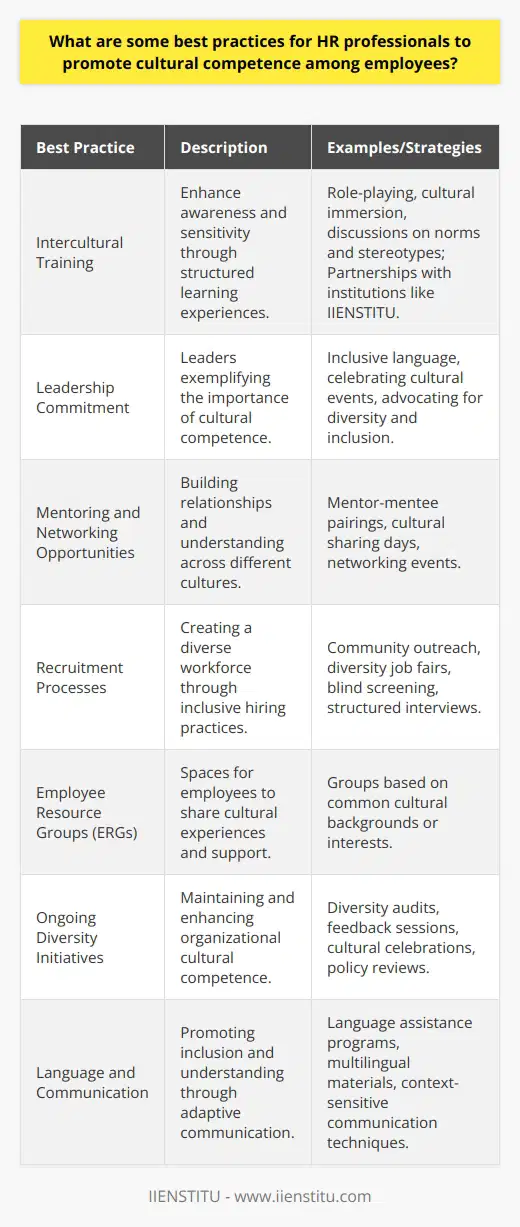
What does HR do in culture transformation?
Role of HR in Culture Transformation
Human resource (HR) departments play a crucial role in driving and sustaining culture transformation within organizations. Culture transformation refers to the process of changing an organization's values, beliefs, and behavior patterns to reflect a more desired culture or to adapt to shifting business environments.
Understanding the Current Culture
The first step in culture transformation is for HR professionals to assess and understand the existing organizational culture. They achieve this by conducting various audits, surveys, and observing employee interactions to identify the current values, norms, and behaviors. Gaining a clear understanding of the existing culture is essential for designing and implementing effective transformation initiatives.
Designing Culture Change Strategies
Next, HR teams develop strategies to facilitate the desired culture change. These strategies may include training and development programs that focus on enhancing leadership skills, improving employee engagement, and promoting diversity and inclusivity. Moreover, HR professionals develop communication plans to ensure that employees understand the goals and benefits associated with the culture transformation process.
Implementing Change Initiatives
HR departments lead the implementation of culture change initiatives by collaborating with leaders and employees across different departments. They ensure that all transformations are aligned with the organization's business objectives while being both realistic and achievable in the given timeframe. HR professionals also ensure that resources are allocated efficiently to support the change efforts.
Monitoring Success and Adapting
Throughout the culture transformation process, HR professionals continuously monitor the success of their change initiatives through various means, such as employee feedback, key performance indicators, and progress reports. By evaluating the impact of change over time, HR teams can make necessary adjustments to reach their desired organizational culture more effectively.
In conclusion, HR departments play a pivotal role in orchestrating and sustaining culture transformation within organizations. By understanding the current culture, designing effective strategies, implementing initiatives, and monitoring success, HR professionals help steer organizations towards a more desired culture that aligns with their overall business objectives.
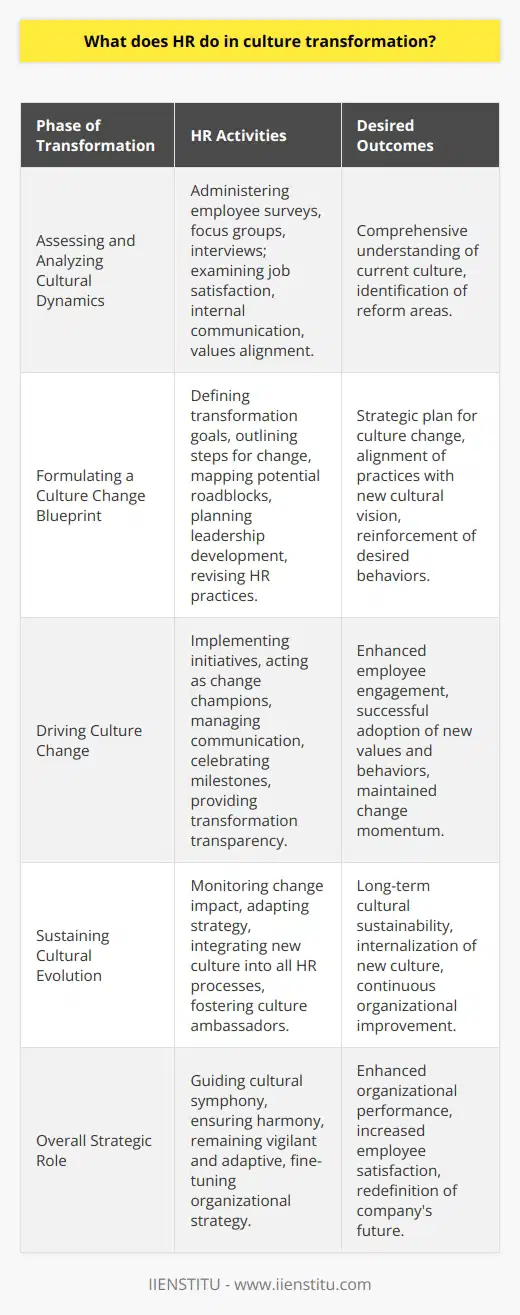
How can HR managers help raise the cultural intelligence of an organization?
Understanding Cultural Intelligence
Cultural intelligence (CQ) is defined as the ability to relate and work effectively across different cultures. It involves understanding, appreciating, and effectively navigating the nuances of diverse cultural settings. HR managers can play a crucial role in raising the cultural intelligence of an organization by implementing various initiatives.
Recruitment and Selection
HR managers can start by incorporating cultural intelligence into the recruitment and selection processes. This may involve evaluating candidates' cultural awareness and adaptability during the interview stage, or ensuring a diverse pool of candidates for open positions. In this way, the organization can select employees who not only possess the necessary job-related competencies but also the ability to engage with culturally diverse clients and colleagues.
Training and Development
To further raise cultural intelligence, HR managers can incorporate CQ training and development programs into the organizational learning experience. This could include offering workshops on cultural sensitivity, unconscious bias, and inclusive communication practices, which could help improve employees' understanding of different cultural norms and behaviors. Additionally, providing specialized training to managers and leaders will equip them to effectively manage diverse teams and foster inclusive workplace environments.
Mentoring and Networking Opportunities
Creating mentoring and networking opportunities focused on building cultural intelligence can also be beneficial. HR managers can establish cross-cultural mentoring pairs and encourage employees from different backgrounds to learn from one another's experiences. Networking events can also foster interactions and exchange of ideas, allowing individuals to gain a deeper understanding of varied cultural perspectives.
Performance Evaluation and Feedback
Finally, HR managers can reinforce the importance of cultural intelligence by incorporating it into performance evaluations and feedback processes. Employees should be assessed not only on their job-related competencies but also on their ability to work across cultural boundaries. Feedback from peers and supervisors can provide insights into areas where individuals may need to improve their cultural intelligence, prompting personal and professional growth.
In conclusion, HR managers can play an essential role in raising the cultural intelligence of an organization. By embedding CQ into recruitment, training, mentoring, and performance evaluation processes, they can foster an inclusive, well-rounded workforce that is better equipped to succeed in today's globally interconnected business environment.
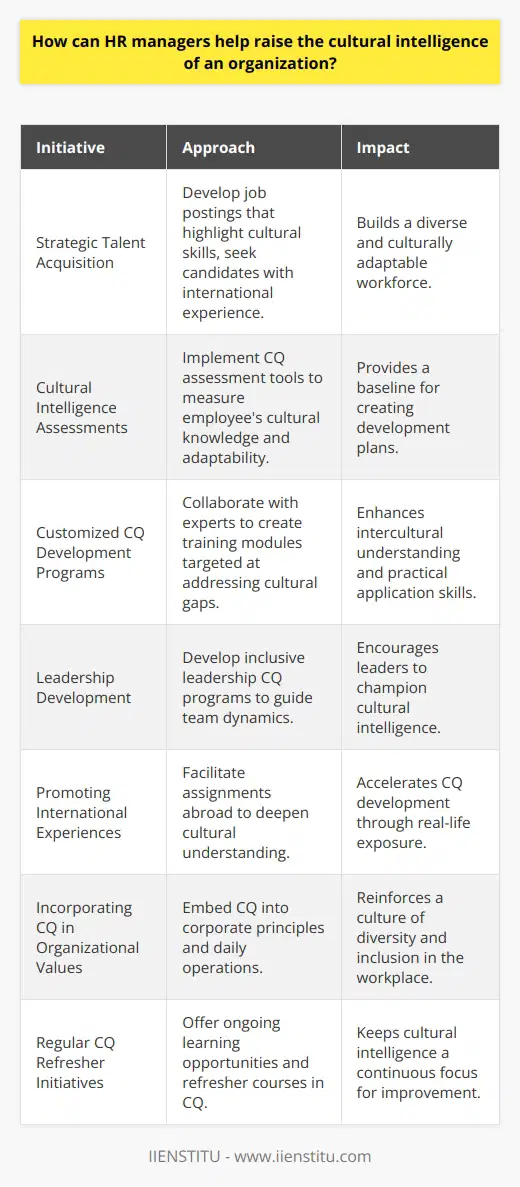
How do you develop cultural awareness in the workplace?
Understanding Cultural Diversity
Developing cultural awareness in the workplace is vital for fostering a harmonious and productive environment. The first step is understanding cultural diversity, which refers to the differences in ethnicity, race, nationality, beliefs, and customs among people. This involves recognizing and respecting the unique perspectives, backgrounds, and contributions which individuals from diverse backgrounds bring to the workplace.
Communication Skills
Effective cross-cultural communication is essential for developing cultural awareness. This means adapting one's communication style to accommodate varying preferences in expressing emotions, resolving conflicts, and sharing information. It also includes learning to listen actively, be patient, and comprehend the nuances in a person's verbal and non-verbal cues. Practicing empathy is critical, as it allows you to put yourself in others' shoes and appreciate their perspectives, fostering mutual understanding and respect.
Cultural Intelligence Training
Implementing cultural intelligence training programs for employees is an effective strategy for enhancing cultural awareness. These programs offer learning experiences to better understand cultural differences and improve interactions among colleagues. Such initiatives might include workshops on cultural sensitivity, team-building activities with diverse teams, and exposure to different cultures through international assignments or workplace exchanges.
Diversity Policies and Inclusivity
Establishing diversity and inclusivity policies in the workplace is a crucial element of promoting cultural awareness. These policies not only ensure equitable access to opportunities and resources for all employees, but they also demonstrate the organization's commitment to fostering an inclusive workforce. This might include creating diversity committees, providing accommodations for religious or cultural practices, and implementing flexible work arrangements.
Engaging with Different Perspectives
Actively engaging with diverse perspectives and ideas is paramount for heightening cultural awareness in the workplace. This involves seeking feedback from colleagues, participating in diversity-focused initiatives, and challenging personal biases and assumptions. Creating a safe space for open discussions, where employees feel respected and valued, can foster an inclusive and culturally-aware work environment.
Continuous Learning
Cultivating cultural awareness is a continuous and lifelong process. Individuals must take responsibility for their learning and be open to understanding new cultures. Reading about different cultures, attending cultural events, and learning new languages can all contribute to a holistic understanding of diversity. In essence, developing cultural awareness in the workplace requires continuous learning, active engagement, and intentional efforts to support and appreciate the unique cultural, racial, and ethnic differences that each individual brings to the table.

What is the role of HR in shaping organizational culture?
Role of HR in Organizational Culture Development
Human Resources (HR) plays a crucial role in shaping organizational culture through strategic initiatives and proactive engagement with employees. HR is responsible for designing policies and practices that foster a positive work environment, ensuring the company's culture aligns with its values and vision.
Recruitment and Selection
The first step HR takes to influence organizational culture is through the recruitment and selection process. HR ensures that candidates possess not only the necessary technical skills but also a cultural fit with the organization. By hiring individuals who genuinely align with the company's values, HR sets the foundation for a cohesive, collaborative work environment.
Training and Development
HR is responsible for providing comprehensive training and development programs to support employee growth and enhance their skills. These programs should be tailored to instill the organization's core values among employees, fostering a culture of continuous learning and improvement.
Performance Management
HR's role in performance management is essential in promoting a performance-driven culture. By designing fair, transparent, and effective evaluation systems, HR helps employees understand the organization's objectives and expectations. Furthermore, it enables managers to provide constructive feedback and recognize top performers, reinforcing the desired behaviors and values.
Employee Engagement Initiatives
Proactively engaging with employees is vital for HR to understand their concerns, and promote a positive organizational culture. HR should institute regular communication channels such as town hall meetings, employee surveys, and suggestion forums to gather employee feedback, fostering a culture of openness and trust.
Conflict Resolution
HR plays a crucial part in addressing workplace conflicts and maintaining healthy relationships among employees. By implementing fair policies and practices for addressing grievances, HR promotes a culture of respect, ensuring that conflicts are resolved promptly and effectively.
Promoting Diversity and Inclusion
A diverse and inclusive workforce is central to creating a thriving organizational culture. HR is responsible for designing diversity and inclusion strategies that foster a sense of belonging and promote equal opportunities for all employees, leading to a more innovative and collaborative work environment.
In conclusion, HR is at the forefront of fostering organizational culture by creating strategies and initiatives that promote a positive work environment, anchored in the company's values and vision. By focusing on recruitment, training and development, performance management, employee engagement, conflict resolution, and diversity and inclusion, HR plays a vital role in cultivating a healthy and productive company culture.
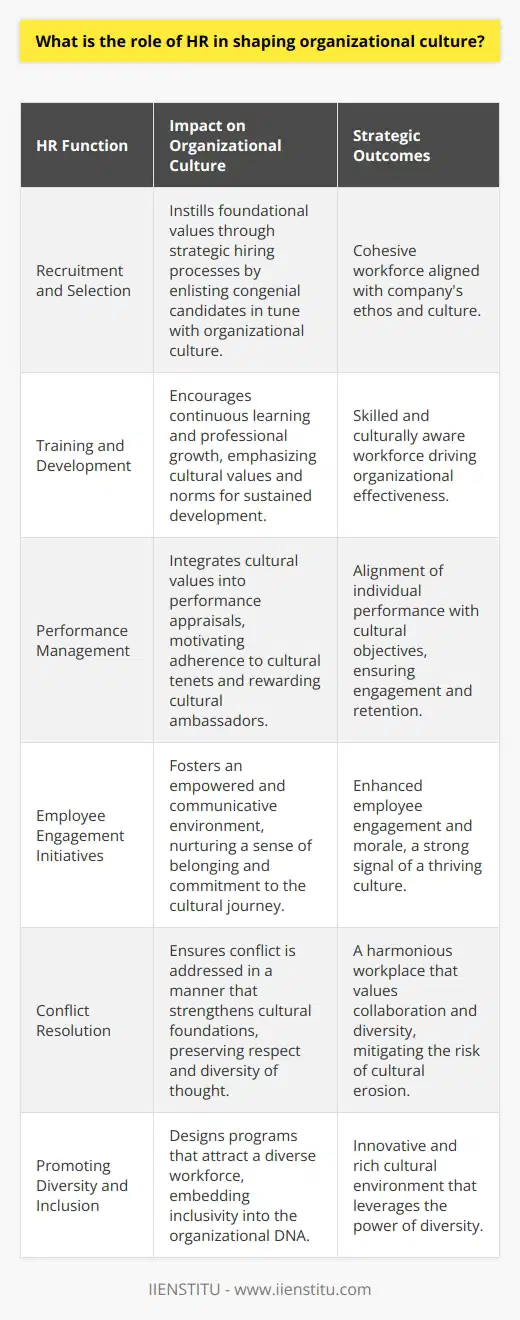
How can HR professionals develop and improve their own cultural awareness to better understand the diverse perspectives of employees?
Developing Cultural Awareness through Training and Development
HR professionals can develop and improve their cultural awareness by participating in cultural competency training programs. These programs help develop a deeper understanding of cultural diversity, biases, and stereotypes, while promoting inclusivity within the organization. They can also engage in online resources, seminars, workshops, and conferences on diversity and inclusion to expand their knowledge and stay up-to-date on best practices.
Engaging with Employees from Diverse Backgrounds
It is essential for HR professionals to interact closely with employees from different backgrounds to get a better understanding of their cultural perspectives. Regular meetings, open forums, and focus groups provide opportunities to listen and learn from their experiences, fostering empathy and respect for diversity. HR professionals can also encourage employees to share their cultural practices, traditions, and celebrations, thereby promoting cross-cultural engagement and understanding within the workplace.
Learning about National and Global Cultures
Familiarizing oneself with the national and global cultures represented within the organization is another critical step for HR professionals to develop cultural awareness. Engaging in intercultural communication helps understand how culture shapes perspectives, attitudes, and behaviors. Reading books, watching documentaries, and attending cultural events and festivals can provide valuable insights into the cultural nuances of different groups.
Creating a Diverse and Inclusive Workplace
HR professionals should lead by example, fostering a workplace environment that values diversity and inclusivity. They can collaborate with employees to design policies, procedures, and practices that promote equity and equal opportunities for everyone, regardless of their cultural background. Providing opportunities for employees to develop and improve their cultural understanding is key to fostering a positive work environment where diverse perspectives thrive.
Evaluating Personal Bias and Assumptions
To truly understand the diverse perspectives of employees, HR professionals must acknowledge and address their own biases and assumptions. Reflecting on one's thinking and behavior patterns helps identify areas of improvement, fostering greater sensitivity and openness. Regularly evaluating personal beliefs and assumptions paves the way for a more culturally aware and empathetic HR professional.
In conclusion, HR professionals can enhance their cultural awareness by engaging in training, learning about national and global cultures, interacting with diverse employees, creating an inclusive workplace, and evaluating personal biases. Developing cultural awareness is crucial to cater to the needs, foster a positive work environment, and promote equity for employees from diverse backgrounds.
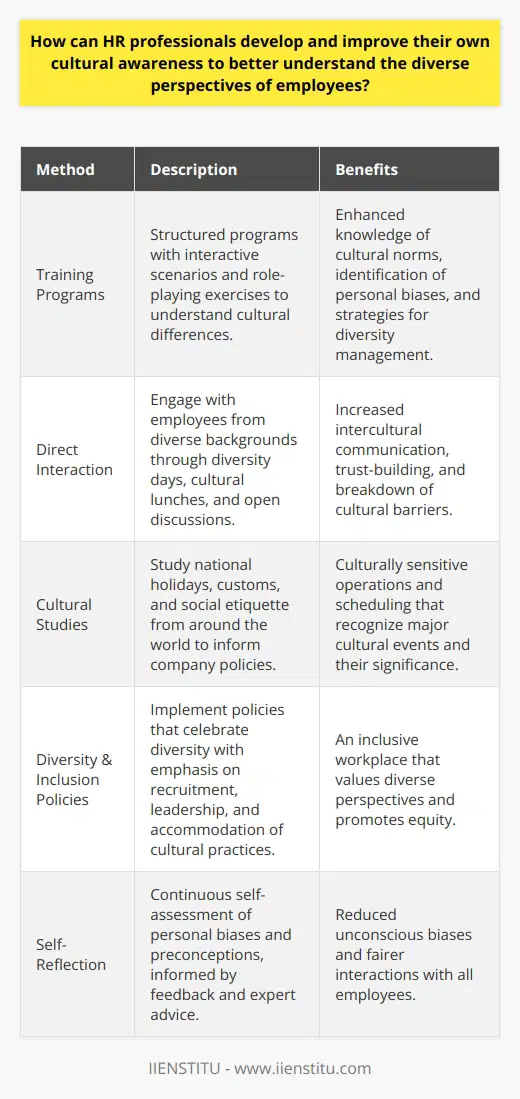
What are some effective strategies for HR managers to foster cultural intelligence within the organization?
Understanding Cultural Intelligence
To effectively foster cultural intelligence within an organization, Human Resources (HR) managers need to be well-versed in a variety of strategies. The basis for implementing these strategies lies in understanding the concept of cultural intelligence, which refers to the ability to recognize, understand, and adapt to different cultural settings and behaviors.
Employee Education
First and foremost, HR managers must focus on employee education. By providing training programs and workshops that address cultural intelligence, employees can develop the necessary skills to work with diverse groups. This can be done through interactive sessions, case studies, or even virtual simulations that allow employees to practice in realistic, culturally diverse environments.
Mentorship Programs
Another effective strategy is the establishment of mentorship programs. These programs can connect employees with experienced mentors who possess high cultural intelligence. This relationship allows employees to learn and assimilate the behaviors and mindset needed to effectively communicate and collaborate across various cultures.
Diverse Recruitment
Encouraging and fostering cultural intelligence also requires recruiting a diverse workforce. By hiring employees from various cultural backgrounds, organizations can create an inclusive environment where different perspectives are valued. This diversity, in turn, can help improve problem-solving, decision-making, and innovation, as well as promote empathy and understanding among employees.
Inclusive Policies
HR managers should also ensure that company policies are inclusive and non-discriminatory. By implementing policies that promote diversity and prohibit discrimination, organizations can create an environment where employees feel valued and included, regardless of their cultural background. Furthermore, HR managers can regularly review these policies to ensure that they remain up-to-date and in compliance with current regulations.
Global Exposure
Lastly, it is essential for HR managers to promote global exposure within their teams. Encouraging employees to participate in international projects, short-term assignments, or even cultural exchange programs can greatly contribute to the development of cultural intelligence. By experiencing different cultures firsthand, employees can gain a better understanding of the nuances and complexities involved in working across cultures.
In conclusion, fostering cultural intelligence within an organization requires a multifaceted approach, including employee education, mentorship programs, diverse recruitment, inclusive policies, and global exposure. By implementing these strategies, HR managers can ensure that their organization remains competitive, innovative and able to navigate the complexities of an ever-evolving global landscape.
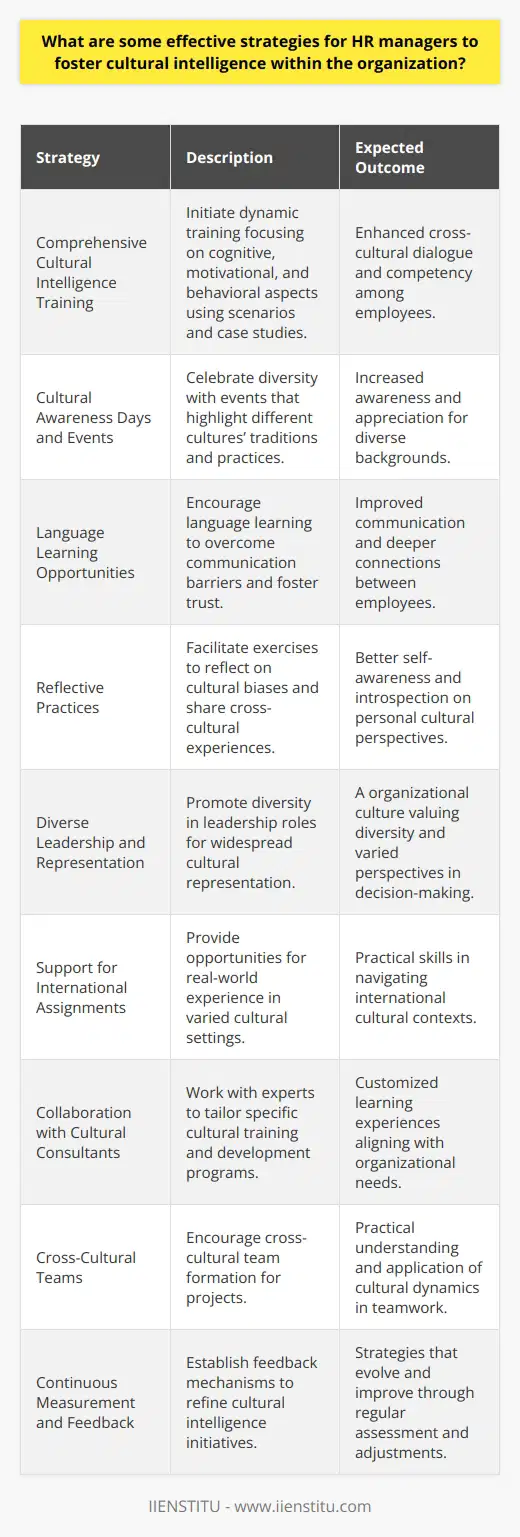
What can HR do to influence diversity and inclusion as part of company culture?
Role of HR in Promoting Diversity and Inclusion
Human Resources (HR) plays a pivotal role in promoting diversity and inclusion as an integral part of company culture. By implementing effective strategies, HR can create a work environment that fosters collaboration and productivity, regardless of employees' backgrounds, beliefs, or abilities.
Creating Inclusive Recruitment Policies
The first step HR can take is to create inclusive recruitment policies, aimed at attracting diverse talent. This includes using bias-free language, seeking candidates from various sources, and offering flexible work arrangements. By ensuring that the hiring process is open and accessible to all, HR can set a solid foundation for a diverse and inclusive workforce.
Establishing Diversity and Inclusion Training
Another important aspect is providing diversity and inclusion training to all employees. This helps to increase awareness of unconscious biases and fosters a proactive mindset for promoting inclusivity. By regularly conducting training sessions, HR can cultivate an ongoing dialogue about diversity and encourage mutual understanding among employees.
Encouraging Employee Resource Groups (ERGs)
HR can support the formation of Employee Resource Groups (ERGs), voluntary groups initiated by employees to foster a more inclusive workplace. ERGs provide a platform where employees can discuss shared interests and experiences, and advocate for positive changes within the company. By endorsing ERGs, HR can facilitate stronger connections between employees and create a sense of belonging within the organization.
Promoting Diversity in Leadership
HR can also influence diversity by promoting diverse individuals to leadership positions. This not only fosters an inclusive company culture but also inspires other employees to see the value in diverse perspectives. By emphasizing diversity in leadership, HR can contribute to the creation of a truly inclusive work environment.
Recognizing and Celebrating Differences
Lastly, HR can ensure that employees feel seen and valued by recognizing and celebrating their unique contributions to the company. This can be achieved through employee recognition programs, targeted towards individuals who have made a positive impact on diversity and inclusion. By acknowledging the efforts of these employees, HR can encourage a commitment to inclusivity throughout the company.
In conclusion, HR plays a vital role in influencing diversity and inclusion as part of company culture. By implementing such strategies, organizations are better equipped to competitively excel, utilizing the full potential of their diverse workforce.
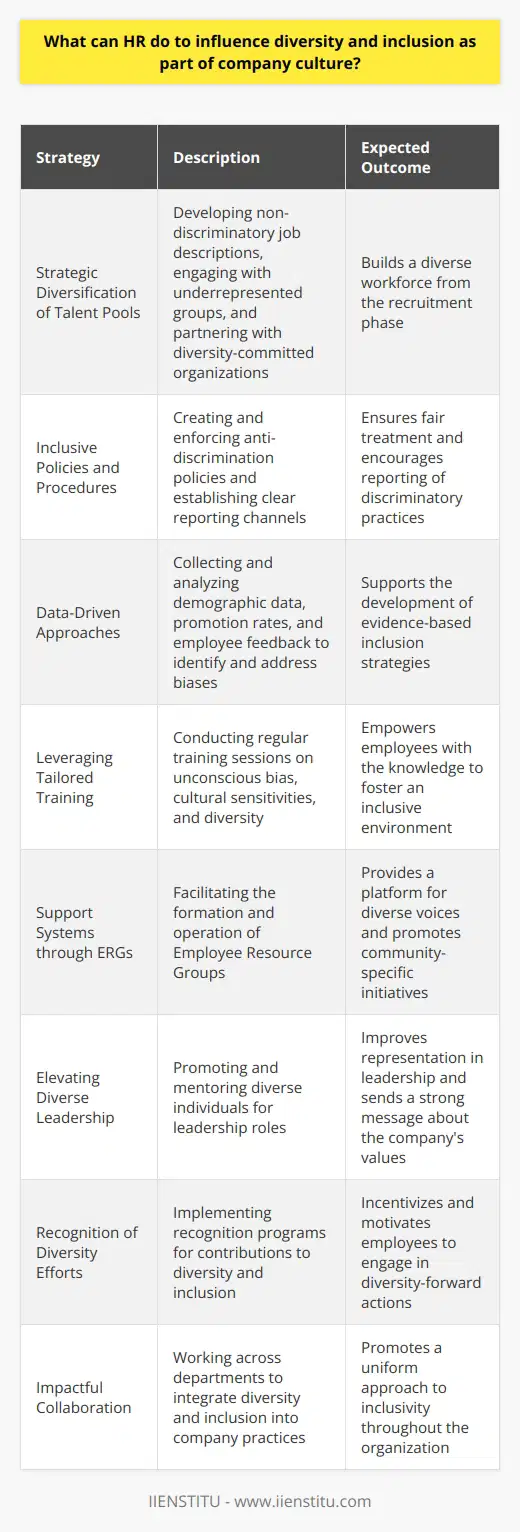
How can HR support employees in navigating cultural differences and facilitating cross-cultural communication within the workplace?
Role of HR in Addressing Cultural Differences
One of the primary responsibilities of Human Resources (HR) is to facilitate constructive cross-cultural communication and manage cultural differences within the workplace. HR can play a significant role in bridging the cultural gap among employees by implementing strategies that promote an inclusive environment, enhance mutual understanding, and foster cooperation.
Inclusive Recruitment and Orientation Process
The process of promoting cultural diversity starts from the hiring stage. HR should adopt inclusive recruitment practices that ensure a diverse workforce, representing different cultures and nationalities. Furthermore, orientation programs introducing new employees to the organization's culture, values, and diverse workforce facilitate smoother interpersonal communication among colleagues.
Training and Development Programs
HR can offer training programs focusing on cultural competence and intercultural communication skills for employees. These training interventions can include workshops, seminars, or e-learning courses designed to educate employees about various cultures, their customs, values, and communication styles. Consequently, such initiatives would lead to a more harmonious and tolerant work environment.
Promoting Cultural Awareness
Creating a culture of awareness and understanding is essential to foster respect for diversity. HR can organize events such as cultural days, diversity weeks, or multicultural potlucks to celebrate different cultures represented in the organization. These events nurture curiosity and empathy among employees, enabling smoother communication and collaboration.
Establishing Policies that Support Diversity
HR should formulate and enforce inclusive policies, guidelines, and procedures addressing discrimination, harassment, and other forms of prejudiced behavior. A clear, transparent grievance mechanism must be in place to ensure that employees feel comfortable addressing issues and seeking resolution for any discrimination they experience.
Mentoring and Conflict Resolution
Mentoring programs that support employees by pairing them with more experienced individuals from diverse backgrounds can serve as a great learning platform. In addition, HR should proactively address any misunderstandings or conflicts arising from cultural differences, helping employees navigate these situations effectively.
In conclusion, HR plays a critical role in supporting employees with diverse cultural backgrounds, fostering an inclusive and supportive work environment. By providing the necessary resources, guidance, and tools to navigate cultural differences, HR not only improves overall communication but also contributes to the organization's growth and success.
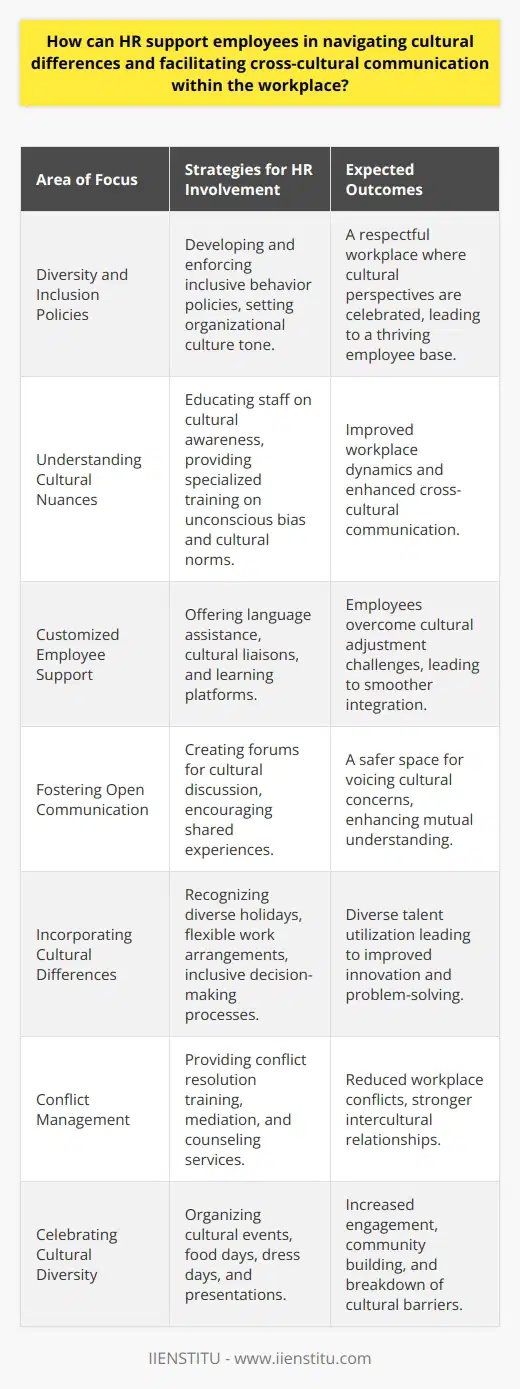
In what ways can HR promote the importance of cultural awareness and sensitivity in order to create a positive work environment?
**Promoting Cultural Awareness and Sensitivity**
In order to create a positive work environment, human resource departments can implement various strategies to promote the importance of cultural awareness and sensitivity. These strategies serve to prevent misunderstandings, promote effective communication, and foster a working environment where employees of diverse backgrounds feel respected and included.
**Cultural Diversity Training Programs**
The implementation of cultural diversity training programs is a crucial step in promoting cultural awareness and sensitivity in the workplace. These programs educate employees on the different cultures represented within the workforce, allowing them to better understand their coworkers and effectively collaborate in a diverse setting. Additionally, these training sessions can help employees identify and challenge their own misconceptions and biases, leading to a more inclusive and harmonious work environment.
**Cross-Cultural Mentoring and Networking Opportunities**
Another method to promote cultural awareness and sensitivity is to provide cross-cultural mentoring and networking opportunities for employees. By connecting individuals from different cultural backgrounds, HR can facilitate the exchange of knowledge and perspectives, broadening employees' understanding of various cultures. This, in turn, can foster empathy and level of trust among staff members, ultimately resulting in a more positive work environment.
**Inclusive Recruitment and Promotion Processes**
Ensuring an inclusive recruitment and promotion process is another key aspect in creating a culturally sensitive workplace. HR departments can develop strategies that emphasize the importance of attracting, retaining, and promoting employees from diverse cultural backgrounds. This commitment to diversity will not only increase cultural awareness within the organization but also signal to employees that different cultural perspectives are valued and respected.
**Employee Resource Groups**
Establishing employee resource groups (ERGs) dedicated to fostering cultural understanding and support within the workplace is another effective approach to promoting cultural awareness and sensitivity. ERGs can serve as a platform for employees to share their experiences and learn from one another, ultimately helping to create an inclusive work environment where employees of all cultural backgrounds feel respected and valued.
Overall, promoting cultural awareness and sensitivity is vital for creating a positive work environment. By engaging in these initiatives, HR has the potential to facilitate a greater understanding of various cultures, increase mutual respect among employees, and ultimately create a more inclusive and harmonious workplace.
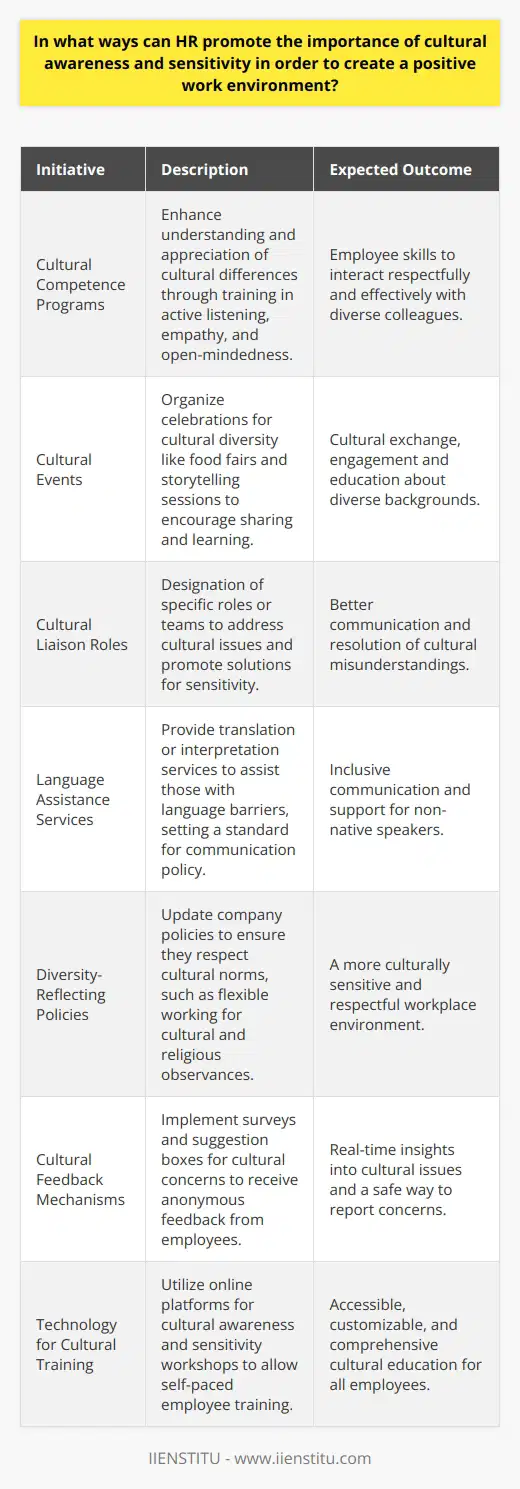
What is the role of HR in cultural transformation?
Role of HR in Cultural Transformation
Creating Organizational Culture Change
The Human Resources (HR) department plays a crucial role in driving and facilitating cultural transformation within organizations. Although the leadership team typically initiates such changes, HR is responsible for implementing the necessary actions to encourage and sustain the desired cultural shift. By creating new policies, updating existing practices, and aligning the organization's mission and values with an inclusive culture, HR serves as the catalyst for a more adaptable and innovative organization.
Facilitating Employee Adaptation
HR must also ensure that employees adapt to the new culture and feel supported during the transition period. To help guide employees through any cultural changes, HR provides training and development opportunities to strengthen their understanding of the updated organizational values and expectations. Additionally, HR should do regular check-ins and solicit feedback from employees, which can help identify and address any challenges they may be facing during adaptation.
Enforcing Cultural Values
Upholding the new values within an organization is a critical aspect of cultural transformation. HR is responsible for enforcing these values by providing clear expectations and guidelines for employee behavior. This may involve updating codes of conduct and revising performance metrics to align with the transformed culture. Moreover, HR should recognize and reward employees who embody the new values to reinforce desired behaviors.
Attracting and Retaining Talent
A successful cultural transformation can significantly impact an organization's ability to attract and retain top talent. HR plays a major role in this process through strategic recruitment and talent management. They must ensure that job descriptions, company branding, and interview processes reflect the new cultural values, fostering a sense of belonging and inclusion. Additionally, HR should oversee employee retention efforts, such as career development and growth opportunities, to maintain a diverse and innovative workforce.
Promoting Open Communication
Open communication is essential for any cultural transformation to thrive. HR should foster a culture where employees feel comfortable sharing their concerns, ideas, and successes. This can be achieved through regular town hall meetings, anonymous feedback channels, and implementing a constructive feedback and recognition culture. By promoting open communication, HR can create a safe environment for employees to voice their perspectives and feel valued, thus driving the desired organizational change.
In conclusion, HR plays a critical role in catalyzing and managing cultural transformation within an organization. They are responsible for creating change, facilitating employee adaptation, enforcing cultural values, attracting and retaining talent, and promoting open communication. In doing so, HR can ensure the success of a cultural transformation, leading to a more dynamic and innovative organization.
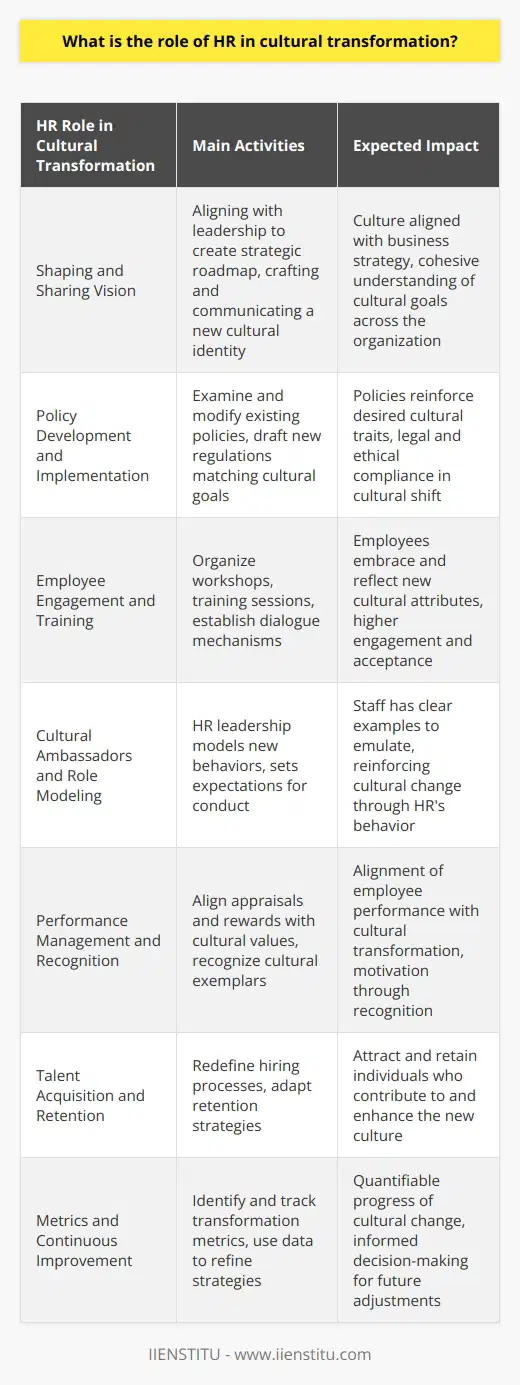
How can HR help improve company culture?
Role of HR in Enhancing Company Culture
Human resources (HR) play a critical role in fostering a positive company culture that aligns with organizational objectives. By implementing strategic policies and practices, HR can bolster employee engagement, enhance job satisfaction, and increase retention levels. This academic paragraph explores various ways that HR can contribute to improving company culture.
Streamlining Recruitment Processes
A key responsibility of HR is to recruit talent that aligns with the organization's values and culture. By refining job descriptions, emphasizing soft skills, and conducting in-depth interviews, HR can identify candidates who will enhance the company's core values and contribute to a collaborative work environment.
Employee Onboarding and Integration
An effective onboarding process can significantly impact a new employee's perception of company culture. HR professionals should design comprehensive orientation programs that introduce employees to the organization's values, mission, and expectations. These initiatives may include mentorship programs and training sessions that facilitate employees' understanding and integration into the company culture.
Continuous Learning Opportunities
HR can create a culture of continuous learning by offering skill development opportunities to employees. By providing professional development programs, workshops, and seminars, HR encourages personal growth and fosters an organizational atmosphere that values knowledge sharing and improvement.
Promoting Open Communication
Open and transparent communication greatly contributes to a positive company culture. HR should develop channels for open dialogue between employees and management. An organization with strong communication is more likely to have an engaged and empowered workforce, allowing employees to feel valued and heard.
Performance Management and Rewards
HR can reinforce a performance-oriented culture by implementing a fair performance management system that rewards high performance in alignment with organizational objectives. Regular feedback, goal-setting, and performance-based incentives demonstrate the company's commitment to employee development, which can improve employee satisfaction and drive an outcomes-focused company culture.
Promoting Diversity and Inclusion
A diverse and inclusive work environment promotes innovation and collaboration. HR plays a leading role in ensuring equitable hiring practices, developing diversity training programs, and fostering a workplace culture that respects individual differences. By doing so, HR can contribute to an inclusive atmosphere that values different perspectives and experiences.
Employee Well-being Programs
To promote a healthy work-life balance, HR should implement well-being initiatives that support employees' physical and emotional wellness. These programs may include flexible work arrangements, wellness resources, and employee assistance programs. Such initiatives demonstrate the organization's commitment to employees' overall well-being, contributing to a positive company culture.
In conclusion, HR has a significant impact on company culture through recruitment, onboarding, employee development, communication, performance management, diversity efforts, and wellness initiatives. By actively promoting these aspects, HR can work towards fostering a healthy, inclusive, and high-performance work environment that aligns with organizational values and objectives.
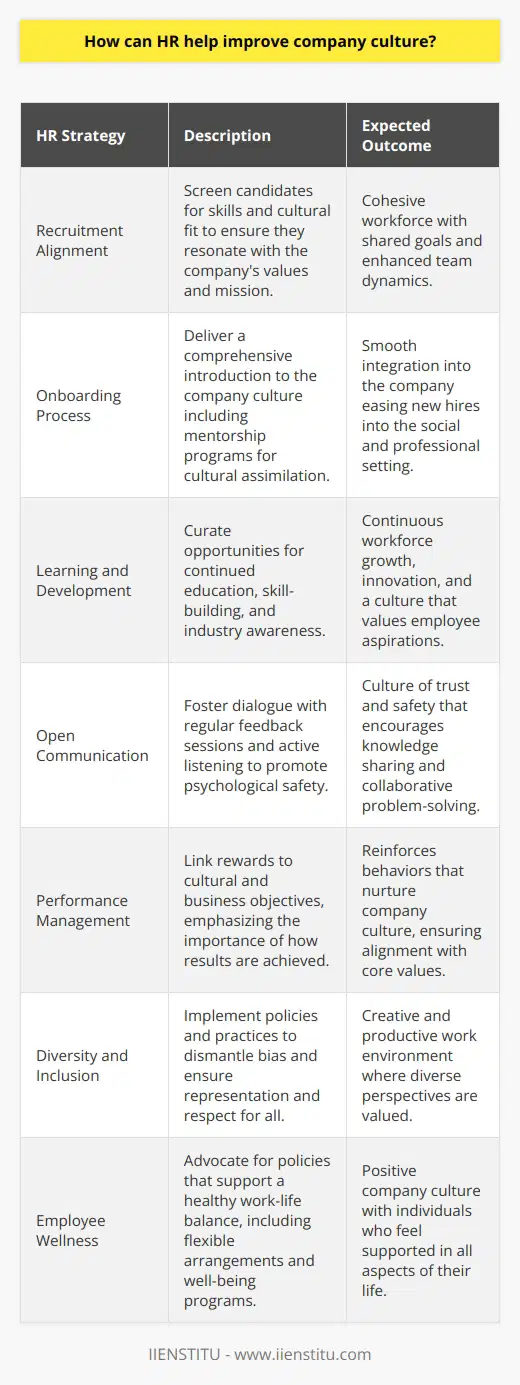
What are the 5 keys leaders need to transform their organization's culture?
Effective Leadership Strategies for Cultural Transformation
Five essential elements for leaders to transform an organization's culture include clear vision, effective communication, role modeling, learning culture, and employee empowerment.
Establishing a Clear Vision
Leaders must have a clear and consistent vision for their organization's culture that aligns with its goals and values. This vision forms the foundation for the cultural transformation process, as it helps direct efforts and decision-making.
Promoting Effective Communication
Effective communication is vital for leaders to foster a positive organizational culture. They must frequently update employees on the organization's goals, values, and expectations through various channels, such as meetings, newsletters, and training sessions. They must also establish open channels of dialogue for employees to express their concerns and ideas.
Embodying Cultural Values
To inspire change from the top down, leaders should exemplify the desired cultural values in their actions and decisions. This role modeling encourages employees to follow suit and embrace the transformation since they observe their leaders embodying the characteristics they are promoting.
Creating a Learning Culture
Leaders must establish a learning culture within their organization, emphasizing continuous improvement and personal growth. By encouraging employees to pursue professional development opportunities and setting up training programs, leaders can foster a growth mindset essential for cultural transformation.
Empowering Employees
Employee empowerment builds a sense of ownership and commitment to the organization's cultural transformation. Leaders should delegate decision-making responsibilities, promote collaborative work environments, and recognize employees' achievements to create a culture where individuals feel valued and motivated to contribute to positive change.
In conclusion, leaders play a crucial role in transforming their organization's culture, and following these five key strategies can ensure that their efforts yield meaningful changes. These strategies build a strong foundation necessary for any organization to thrive and succeed in today's competitive business environment.
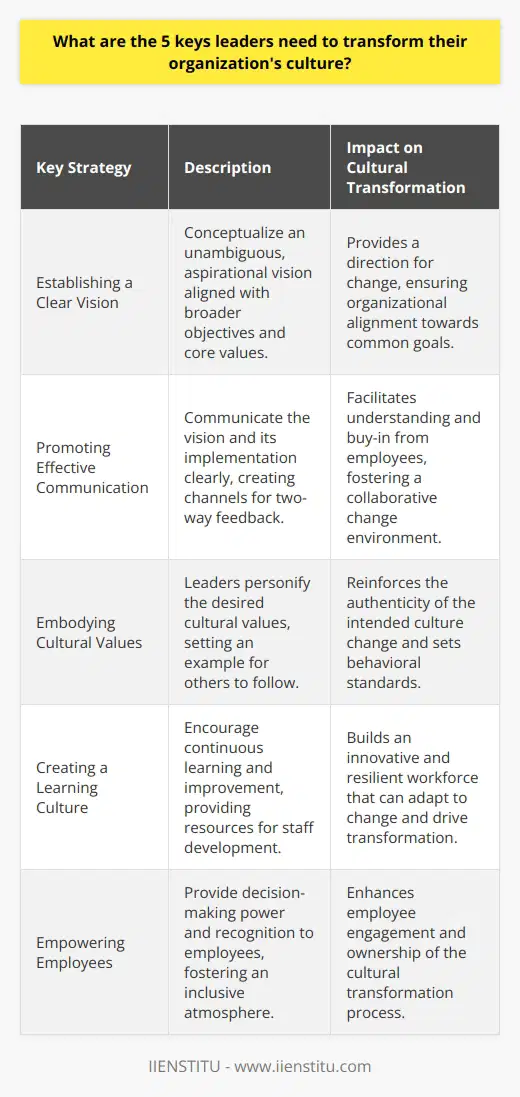
What role does HR play in shaping corporate culture?
Role of HR in Corporate Culture Development
Human resource (HR) departments are crucial in molding the corporate culture of organizations. They initiate, maintain, and enhance the values and norms that define the working environment. Through policy implementation and strategic leadership, HR significantly influences how employees perceive and navigate the workplace.
Implementing Organizational Policies
The development of organizational policies is a major aspect of the HR function. These policies, which include code of conduct, diversity and inclusion, and employee engagement, provide the foundation that shapes an organization's culture. By actively introducing and implementing these policies, HR ensures adherence to the prescribed values, thereby establishing a strong corporate culture.
Fostering Employee Engagement
Employee engagement is central to a vibrant corporate culture. HR professionals are responsible for designing programs and initiatives that foster engagement, collaboration, and camaraderie among employees. Examples of such initiatives include training and development programs, team-building activities, and peer recognition schemes, which all contribute to a positive work environment.
Promoting Diversity and Inclusion
Inclusivity and diversity are essential components of a healthy corporate culture. HR plays a critical role in promoting an inclusive atmosphere by implementing unbiased recruitment strategies and offering diversity training to employees and managers. By cultivating a culture of inclusion, HR not only elevates employee morale but also positions the organization for greater long-term success.
Enhancing Internal Communication
Effective communication within an organization is key to a cohesive corporate culture. HR professionals are responsible for facilitating open communication channels, encouraging employees to voice their concerns, and promoting a transparent organizational structure. This approach to communication contributes to employee satisfaction and trust in the workplace, reflecting positively on the organizational culture.
Leading by Example
As role models, HR professionals must embody the organizational values they aim to promote. They must demonstrate ethical behavior, commitment to diversity, and effective communication skills. By leading by example, HR practitioners can inspire employees to adopt the ideals and principles that define the organization's culture.
In conclusion, HR professionals play a central role in shaping an organization's corporate culture by implementing policies, fostering employee engagement, promoting diversity and inclusion, enhancing internal communication, and leading by example. An effective HR department is instrumental in creating an environment where employees can thrive and contribute to the success of their organizations.
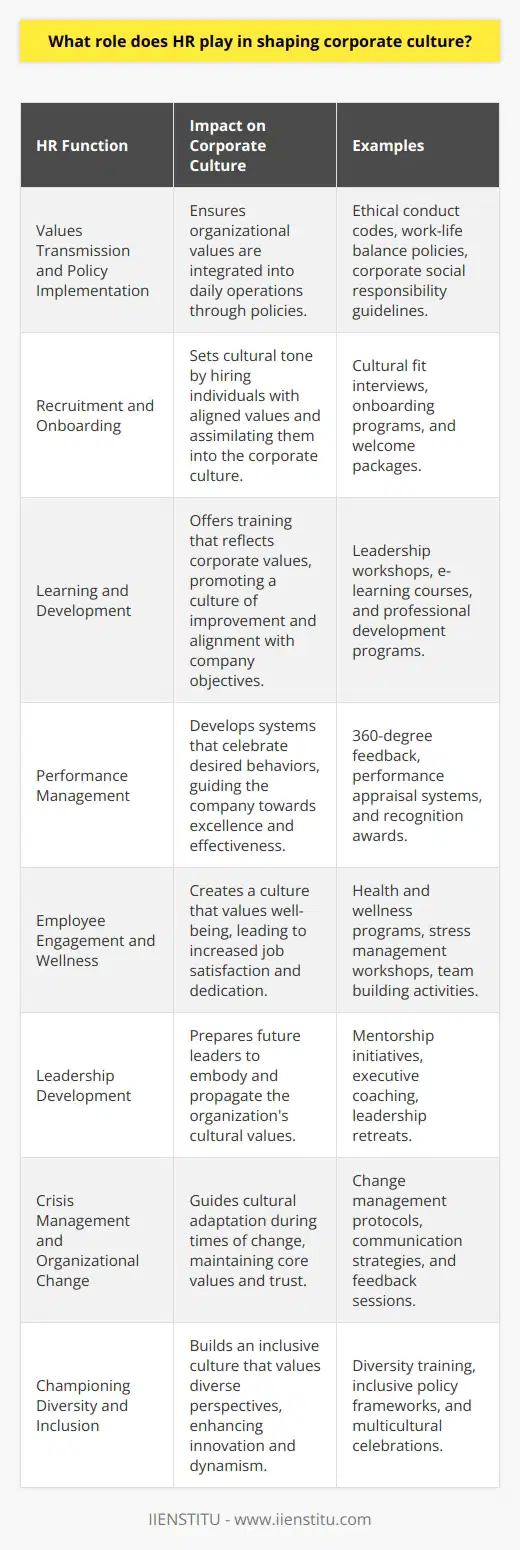
What can HR do to improve company culture?
Role of HR in Enhancing Company Culture
Fostering an Inclusive Environment
To improve company culture, HR can focus on cultivating a climate of inclusivity by implementing equitable policies and practices. This entails considering the unique perspectives and experiences of employees, thereby enabling a diverse workforce to thrive in the organization.
Promoting Open Communication
Another approach for HR to enhance company culture is fostering open communication channels that give employees the opportunity to voice their opinions, concerns, and ideas. This environment encourages collaboration and cooperation among team members, ultimately leading to a strong company culture.
Engaging in Employee Recognition
HR can significantly impact company culture by frequently acknowledging and rewarding employees for their hard work and dedication. Developing a system that celebrates small victories and milestones can encourage a positive work environment and motivate staff to perform at their best.
Providing Professional Development Opportunities
Offering employees various avenues for professional growth and development is another effective way HR can contribute to outstanding company culture. By investing in their team members' skillsets, HR demonstrates a commitment to their future and nurtures a high-performing workforce.
Physical Surroundings and Work-Life Balance
Lastly, HR can address workplace aesthetics and policies that directly impact employees' day-to-day experiences. Considering office design, comfort, flexibility, and work-life balance as important components of company culture can lead to higher satisfaction levels and increased productivity among team members.
In conclusion, HR can improve company culture by focusing on inclusivity, nurturing open communication, recognizing employees' efforts, offering development opportunities, and considering the physical and policy-based aspects of the work environment. By tackling these components, HR can create a positive and flourishing company culture that retains top talent and boosts the organization's success.
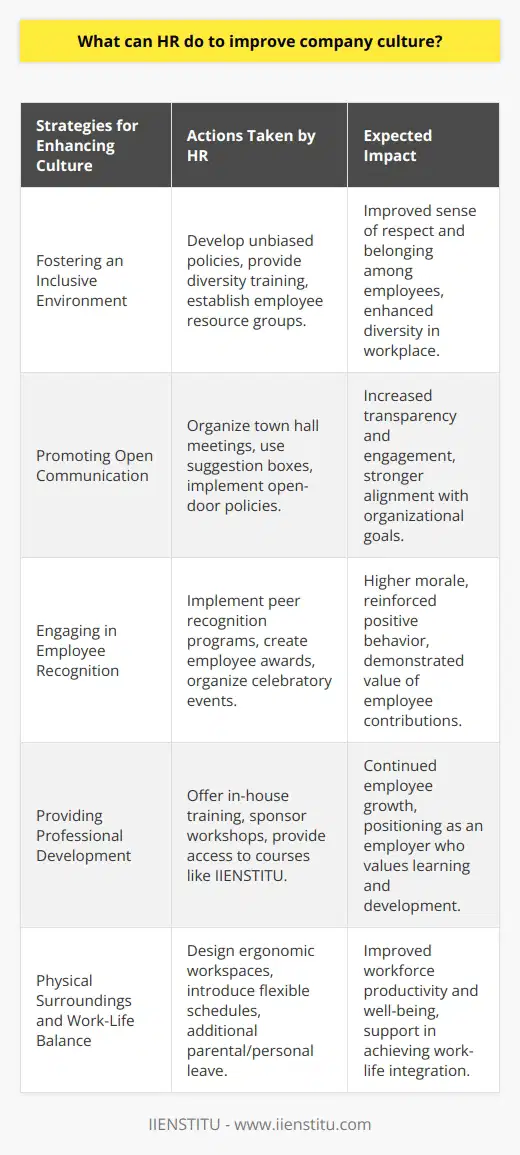
What are the 5 keys leaders need to transform their organization's culture?
Understanding the Transformation Process
To effectively transform their organization's culture, leaders must grasp the significance of five key components essential for cultivating an environment conducive to change.
Establishing a Clear Vision
First, leaders need to develop a clear vision for the desired outcome of the cultural transformation. This vision should be communicated to all employees in a manner that resonates with their values and inspires them to adopt the new direction.
Building a Cohesive Leadership Team
Second, the formation of a cohesive leadership team is crucial to ensure that all managerial staff share the same understanding of the transformation goals and are committed to driving the necessary changes. This united front fosters consistency in decision-making and execution of change initiatives.
Engaging and Empowering Employees
Third, engaging and empowering employees throughout the transformation process is of paramount importance. This involves seeking their input, addressing their concerns, and providing them opportunities to develop the required skills and competencies. Employees who feel invested in the change are more likely to actively participate and contribute to the overall success of the transformation.
Fostering a Culture of Continuous Improvement
Fourth, embracing a culture of continuous improvement encourages the organization to consistently evaluate its processes and practices, and adapt to meet changing internal and external demands. By fostering this mindset, leaders create an environment that supports innovation and drives performance improvements.
Developing Metrics and Holding People Accountable
Lastly, leaders must develop appropriate performance metrics and hold individuals accountable for their role in the transformation process. By setting clear expectations and evaluating progress against these benchmarks, leaders can ensure that the necessary changes are effectively implemented and sustained.
In conclusion, leaders seeking to transform their organization's culture must focus on establishing a clear vision, building a cohesive leadership team, engaging and empowering employees, fostering a culture of continuous improvement, and developing metrics and accountability mechanisms. By mastering these five key areas, leaders can foster a culture that drives organizational success and adaptability in a rapidly changing business environment.

What role does HR play in shaping corporate culture?
Role of HR in Developing Corporate Culture
HR departments have a significant role in shaping corporate culture. They create organizational structures. These structures define relationships and roles within an organization. This anchors employee behavior and communication.
Influence on Employee Behavior
HR policies influence the behavior of employees. They develop and implement policies that promote desired behaviors. These include code of conduct, anti-discrimination policies, and others.
Structural Development
HR contributes to structural development. They help in designing jobs, reporting hierarchies, and workflow processes. Such structures can affect employee interaction patterns, collaboration, and communication.
Training and Development
Also, HR plays a vital role in workforce training and development. They plan and execute training programs that align with corporate culture. They encourage knowledge sharing and collaborative learning within the organization.
Recognition and Rewards
HR is responsible for instituting recognition and reward systems. These systems reinforce positive behavior. They incentivize cultural alignment and engagement. Promotions, rewards, appraisals, and recognitions can shape employee behavior.
Recruitment and Selection
HR influences corporate culture through recruitment and selection. They choose candidates who align with the company’s culture. These employees contribute to maintaining and strengthening the culture.
Communication and Engagement
Moreover, HR plays a key role in maintaining an open line of communication. They facilitate engagement. They address employee concerns and take feedback.
In conclusion, HR plays a crucial role in shaping corporate culture. They influence employee behavior, develop structures, run training programs, manage rewards, recruit and select employees, and facilitate communication.

How can HR help improve company culture?
HR's Role in Shaping Company Culture
Human Resource (HR) departments play a critical role in fostering and enriching company culture. HR, primarily, establishes an organization's character and ethos by influencing its policies and practices.
HR and Core Values
The HR department is responsible for defining and instilling the core values of the organization. These values guide employee behavior, and ultimately, help shape the company's culture.
Role of HR in Recruitment
During recruitment, HR has the ability to hire individuals who align with the company's values. This ensures that the culture strengthens as the company expands and grows.
Importance of Training in Culture Building
HR also tailors training programs to cultivate desired behaviors and attitudes. Such employee development initiatives lead to a more cohesive and harmonious work environment.
HR-Management Collaboration for Culture Building
HR has the power to influence management practices, further impacting the work culture. By collaborating with management, HR ensures company values are evident in each decision-making process.
Employee Engagement and Culture Enhancement
HR also devotes efforts to boost employee engagement, a key factor in enhancing company culture. This involves creating opportunities for communication and teamwork, thus fostering a sense of belonging among employees.
Addressing Employee Grievances
Lastly, HR helps improve company culture by addressing employee grievances. By ensuring a fair system of rewards, recognition, and conflict resolution, HR contributes to a positive and nurturing work environment.
In conclusion, HR plays a multi-faceted role in shaping and improving company culture. It serves as the architect of core values, gatekeeper in recruitment, facilitator of employee training, collaborator with management, driver of employee engagement, and provider of a just and positive work environment.

What are the 5 keys leaders need to transform their organization's culture?
Adopting a Visionary Approach
Leaders aiming for culture transformation should demonstrate visionary leadership. A clear and appealing vision drives the change process and fosters passion amongst employees.
Commitment to Effective Communication
Effective communication forms the backbone of successful cultural change. Leaders need to consistently and convincingly articulate the rationale for transformation to receive employee buy-in.
Promoting Employee Participation
Promoting inclusiveness and active participation aids in building ownership. Engaging employees in conversations about change creates a shared commitment to the organization's evolving culture.
Practice of Empowerment
Instilling a sense of empowerment among employees is an integral ingredient for change. Leaders should provide necessary tools and authority to employees for them to feel empowered and motivated to embrace change.
Building a Culture of Learning
Finally, leaders should foster a learning culture. By encouraging continuous learning and leaving room for growth and development, leaders can ensure that the organization's culture remains dynamic and progressive.
In conclusion, these five key aspects form the foundation for leaders in their endeavor to transform an organization's culture. By understanding and embodying these aspects, leaders can pave the way for successful cultural change in their organizations.

